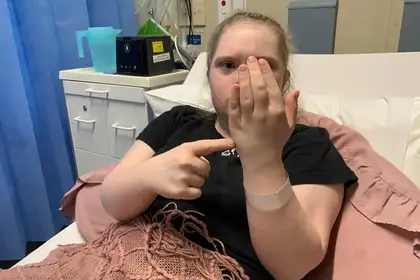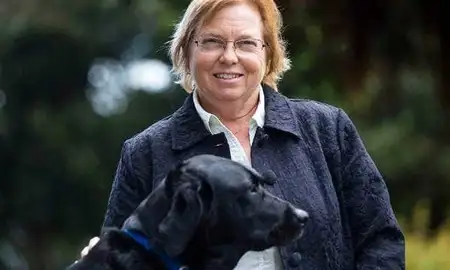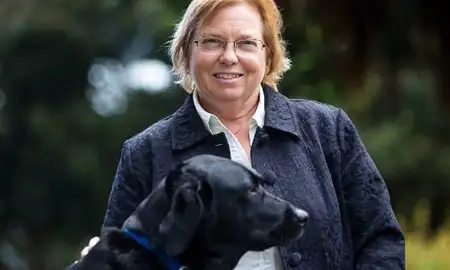
Patient Tarryn Attwell using sign language while in hospital.
A team of researchers from Massey University, Victoria University of Wellington and Kaitiaki Research and Evaluation released the first of several disability-focused papers this week.
The study focused on deaf people’s experiences of healthcare access and found that healthcare provision consistently breached the human rights guaranteed under the United Nations Convention on the Rights of Persons with Disabilities (CRPD).
These human rights breaches centred on the imposition of universal mask use, which meant that deaf people, who rely on lip reading and being able to see facial expressions, were not able to communicate with, or understand what health professionals were saying.
Dr Michael Roguski from Kaitiaki Research and Evaluation, who co-authored the paper, says, “This is a human rights issue as health professionals failed to make reasonable accommodations, like using face shields or masks that allow the lips to be seen. Rather, our participants shared experiences that reflect an inflexible medical system."
In addition to mask use, the paper noted a wide variety of human rights infractions. Examples included deaf people in hospital emergency departments being denied an interpreter because of infection control policies that resulted in significant and prolonged treatment delays. In these cases, the hospitals viewed the interpreter as a support person, not as someone integral to the individual’s healthcare.
Often insurmountable difficulties accessing the health system meant that deaf people disengaged from health services during the pandemic.
Dr Roguski stressed that the failure of health professionals to make reasonable accommodations left many people in pain or choosing to only access healthcare in extreme situations.
“In one case, we heard of a woman who was rushed to hospital in significant pain. Because she was not allowed an interpreter, she was not given pain relief for three hours."
The research also identified a series of ableist assumptions that contributed to access difficulties. Most common was the assumption that deaf people can readily engage with the English language, a belief that fails to appreciate that Sign Language is a unique language denoted by its own grammar and sentence structure and English is often the individual’s second language.
Dr Roguski stresses that the research again highlights New Zealand’s failure to ensure that our health system is geared to the needs of disabled people.
“New Zealand ratified the CRPD in 2007 and the Convention guarantees that disabled people have the right to enjoy the highest attainable standard of healthcare without discrimination on the basis of disability. It is concerning that our health system and health professionals have failed to incorporate these rights into daily practice and service delivery."
Dr Gretchen Good from Massey's School of Health Sciences was another co-author of the paper. Read the paper in full here.
Related news
Impact of COVID-19 on disabled people’s access to health care unfolds in new collaborative research
School of Health Sciences Dr Gretchen Good is part of a new research team examining the impact of the COVID-19 pandemic on people with disabilities, particularly in their access to health care.

Challenges of parenting disabled children during a pandemic
Two Massey researchers are calling for more support from the Ministry of Education and disability support agencies.
